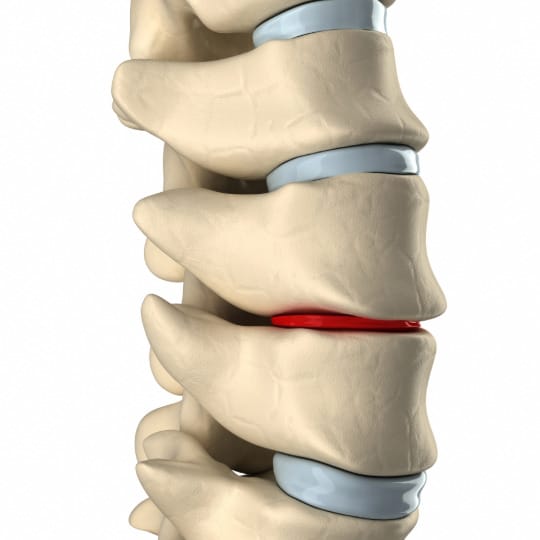Disc Herniation
Condition Overview
Your spine is made up of a series of bones called vertebrae, cushioned by soft, gel-like discs. These discs act as shock absorbers, allowing your spine to be flexible. A disc herniation occurs when the soft inner material of a disc pushes out through a tear in its tougher exterior. This displaced material can press on nearby nerves, leading to a variety of symptoms.
Several factors can contribute to a disc herniation. The most common cause is age-related wear and tear, known as disc degeneration. As we age, our spinal discs lose some of their water content, making them less flexible and more prone to tearing. Other risk factors include repetitive lifting, being overweight, leading a sedentary lifestyle, and genetic predisposition.

Our Treatments
A Natural, Non-Surgical Approach to Disc Herniation Relief
At Advanced Health & Wellness Center, our mission is to help you find lasting, drug-free relief from disc herniation—without the need for invasive surgery. We take a patient-centered, whole-body approach, crafting personalized care plans that target the root cause of your pain and support long-term healing and recover
Natural Chiropractic Care
Our expert chiropractic team specializes in gentle, targeted adjustments to restore proper alignment and relieve pressure on the spinal nerves. By improving spinal mechanics, chiropractic care helps reduce inflammation, improve mobility, and support the body’s natural healing process—especially important when managing herniated discs.
Spinal Decompression Therapy
This cutting-edge, non-invasive therapy gently stretches the spine to relieve pressure on compressed discs and nerves. By creating space between the vertebrae, spinal decompression promotes increased circulation of nutrients and fluids, allowing herniated or bulging discs to retract and heal. It’s a safe, highly effective option for patients suffering from lower back pain, sciatica, or disc-related nerve irritation.
Class IV Laser Pain Relief
Using deep-penetrating therapeutic light, Class IV Laser Therapy stimulates cellular repair, reduces inflammation, and improves circulation in the affected area. This FDA-cleared treatment is a powerful tool in promoting faster healing of damaged disc tissue and surrounding structures—without pain, downtime, or side effects.
Patient Testimonials
“I thought surgery was my only option for my sciatica. The team at Advanced Health Wellness Center in Wadsworth created a plan that completely resolved my pain. I can’t thank them enough!”
– Josh M.
“The personalized care I received was fantastic. They didn’t just treat my herniated disc; they taught me how to prevent future issues. I feel stronger and more confident than ever.”
– Sara P.
“From the front desk to the therapists, everyone was professional and caring. The manual therapy provided immediate relief, and I’m finally back to my daily walks without pain. Highly recommend this place.”
– David K.
FAQ’s
Frequently Asked Questions

Do I need surgery for disc herniation?
The vast majority of patients do not need surgery for disc herniation. Conservative treatments like the ones we offer are highly effective. Surgery is typically only considered if symptoms worsen despite several months of non-surgical care, or in cases of severe nerve compression.
How long does recovery take?
While every patient’s journey is unique, many people experience significant improvement within 6 to 12 weeks of starting a consistent treatment program. Your commitment to the plan is a key factor in a successful outcome.
Is it okay to exercise with a herniated disc?
Yes, but it must be the right kind of exercise. General exercise can make things worse, but a targeted program prescribed by a physical therapist is one of the most important things you can do to heal. It’s crucial to avoid activities that cause pain.
For a more in-depth look at disc herniation, the Journal of Contemporary Chiropractic offers an excellent patient resource.
Are there any long-term effects of a herniated disc?
While some individuals recover fully, others may experience chronic pain or recurring symptoms, highlighting the importance of a comprehensive treatment plan to minimize long-term complications.
